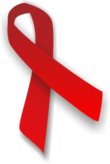
December 1st has been known as World AIDS Day since 1988. But how many times since 1988 do you remember thinking about it as such? Many people have become desensitized to the fact that AIDS is still a huge problem in the world. They don't remember that this is not an isolated disease that affects only one group of people. This is a serious and completely preventable disease. And while doctors and scientists have made great advances in fighting the disease, more can be done by the common man to prevent this disease from spreading more than it already has.
The disease we call AIDS was first identified in 1983 by Dr. Luc Montagnier's team at the Pasteur Institute in France. Since then, scientists have identified AIDS as the epidemic of the 20th century that has spilled over just as destructively into the 21st. AIDS is spread by a virus known as HIV. HIV is a sexually-transmitted disease that can lead to AIDS after a long incubation period in the body. And because the disease is sexually-transmitted, it is completely preventable.
However, the number of people AIDS has infected or killed is very disturbing. According to health organizations, AIDS has lead to the death of 30 million people worldwide. And it is known that 40 million people are infected with HIV. In 2005 alone, AIDS lead to the death of 3.1 million people. Despite all efforts, a cure has yet to be found. Because of this, prevention has always been the most lauded way of keeping AIDS from spreading. The effort has lead to some good results, but more work needs to be done.
In the United States, AIDS is still seen as the "gay disease." And it is that prevailing thought that keeps prevention campaigns from working. In America, homosexuals are not the most infected group. In fact, AIDS is most often found in African-Americans and Latinos. But no matter what the infected group, we must overcome the ridiculous stereotypes and the moronic thoughts of "this doesn't matter because it doesn't affect me." We have to realize that has a species, this disease is harming us. If we care at all about human life, we must do more to prevent this disease in the US. For that reason, I advocate more education on sexually-transmitted diseases and prevention in schools. It is not morally wrong for us to teach kids how to save their own lives.
Worldwide, many countries have started successful prevention programs. Numbers of case are down somewhat. However, in Africa the disease is still a top killer of all age groups. In 2005, 570,000 children died because of AIDS. For prevention to work in Africa, I feel we need the involvement of a higher power. The Catholic Church has long held a tradition for the non use of condoms and other birth-control devices. For whatever backwards reason, the Church sees this as the prevention of God's work. I see it as the killing of God's people. It is high time the Catholic leadership change their stance on this issue. Saving life is more important that producing more. It is not morally wrong to save a life it all it takes is a latex condom.
This is a day for remembrance. AIDS is a real problem. We must do all we can to help prevent the spread of this disease anymore. It is also important to make sure that research continues toward the goal of finding a cure for the disease. If it takes another 25 or 50 years, it is worth it. If prevention can stop the spread, maybe by the time a cure is found, not many people will need it.
No comments:
Post a Comment